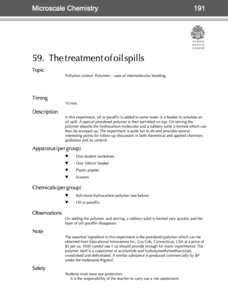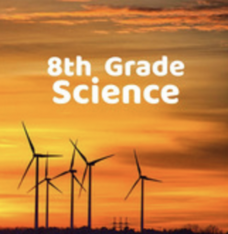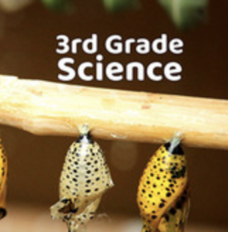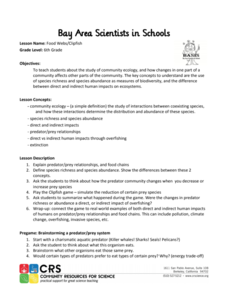Royal Society of Chemistry
The Treatment of Oil Spills—Microscale Chemistry
When oil spills happen, how is the oil cleaned up? Pupils of polymer science discover an amazing substance that turns oil into a solid during a microscale experiment. Individuals observe oil or paraffin before and after addition of the...
Utah Education Network (UEN)
Utah Open Textbook: 4th Grade Science
How does weather affect Earth? Learners understand the characteristics of water and make predictions about weather patterns. They recognize how water and weather affect rocks and minerals through erosion. They also learn about fossils...
Utah Education Network (UEN)
Utah Open Textbook: 8th Grade Science
The cycle of energy is important to many different systems on Earth. Scholars use questioning and observation to investigate the differences between renewable and non-renewable resources and how they relate to global changes. They...
Wilderness Classroom
Ocean Life
Our oceans are composed of many complex relationships. Young oceanographers explore relationships between organisms, understand the world ocean's currents, and discover the effects of water pollution and how it behaves. There are three...
Florida Department of Environmental Protection
Build Your Own Aquifer
Ever wondered how an aquifer works? Introduce your class to the amazing way many people get water by exploring how underground aquifers work. Two fun hands-on activities are used to help kids understand what an aquifer is, how it works,...
Earth Day Network
Conserving Water Through Art!
Having fresh, clean drinking water is a privilege many people take for granted. Help raise awareness about the scarcity of water and the importance of conservation by discussing different ways water is used in everyday life. Brainstorm...
National Wildlife Federation
The Water Cycle
Observe the water cycle from the comfort of your classroom with this excellent earth science experiment. Working collaboratively, young scientists first create terrariums complete with hills, plants, lakes, and an atmosphere,...
Scholastic
Mindful Listening
Teach your middle schoolers to use their ears to their highest potential! Pupils practice active listening skills and reflect on how careful listening might prove to be important in and out of the classroom.
TryEngineering
Program Your Own Game
Young computer scientists get to see what it's like to be a software engineer as they use free online software to design a computer game. They play and evaluate games groups created to round out the activity.
Project WET Foundation
The Blue Planet
What a neat interactive that interacts with the amount of water on Earth's surface. It begins with a brief audio introduction of the Blue Planet and how it got its name. Then, users click on the activity to play a game that calculates...
Agriculture in the Classroom
"Steer" Toward STEM: Careers in Animal Agriculture
Think like an engineer and an agricultural scientist over the course of 12 lessons in a STEM based unit. Young scientists take on the roles of animal physiologists, animal geneticists, agricultural engineers, animal nutritionists, and...
Magic of Physics
Electric Circuits
Teaching about circuits can be as easy as flipping a switch! Science scholars explore the world of electricity using a fun interactive. The resource uses drag-and-drop images to promote an understanding of circuit components, types of...
Benjamin Franklin Tercentenary
Let’s Throw an Electric Science Party!
Are you looking for a shockingly good lesson? Check out one that has middle schoolers recreate four of Benjamin Franklin's experiments. Groups investigate, observe, and draw conclusions about static electricity and electrical current....
National Wildlife Federation
Danger from Afar: Non-Point Source Pollution and the Lake Superior Basin
How prevalent is pollution in the water system? A hands-on activity focuses on one area that is prone to pollution. Learners use game chips to represent clean water and polluted water and complete an activity that demonstrates how...
Beyond Benign
Evaluating Sustainability and Lifecycle
What makes one product greener than another? Ecology scholars analyze sustainability and lifecycle through a thought-provoking activity. Individuals pick a product, then examine its components to determine its overall impact on the world...
Colorado State University
Can Boiling Make Something Freeze?
Use boiling as an avenue for freezing. Young scholars watch as liquid nitrogen removes heat from the ingredients for ice cream. As this happens, the nitrogen boils and the ice cream freezes—all in the same container. A little science magic!
Utah Education Network (UEN)
Utah Open Textbook: 5th Grade Science
How do Earth's changes affect humans? Pupils learn about physical and chemical changes on Earth and how they lead to erosion, earthquakes, and volcanoes. Using the text, they also explore the concepts of electricity and magnetism by...
Utah Education Network (UEN)
Utah Open Textbook: 3rd Grade Science
How do we interact with Earth? Scholars learn about the sun, Earth, moon, forces, gravity, and heat sources by reading a text and performing hands-on demonstrations. They also differentiate between living and non-living things using...
Community Resources for Science
Food Webs/Clipfish
Human impact on habitats can be alarming. A hands-on activity has learners explore the impact of human interactions with different environments using a gamified approach. They simulate the impact of a species' abundance under different...
Alabama Wildlife Federation
Forest Floor Investigation
Most living things go unnoticed. Change that using a fun activity about the nutrient cycle. Pupils use hula hoops to mark areas of study and then make observations about the living things they see. They first make surface observations,...
Sea World
Seals, Sea Lions, and Walruses
Learn about the mammals of the sea with a lesson about seals, sea lions, and walruses. Kids study the characteristics of each pinniped with flash cards and information, and then analyze data about elephant seals, measure heat loss in...
Ask a Biologist
Human Skeleton Anatomy Activity
Young biologists piece together the puzzle of the human body with this simple anatomy learning exercise. Presented with a picture of the human skeleton, students are challenged with the task of correctly identifying the 27 bones...
Messenger Education
Design Challenge: How to Keep Items Cool in Boiling Water
Keeping items cool in boiling water... what? This engaging activity challenges high school learners to build a container that keeps butter in a solid state when placing the container in boiling water. Groups use previous knowledge and...
National Institute of Open Schooling
Solutions
Aqua regia, or royal water in Latin, is a solvent that can dissolve solid gold and platinum into a solution. Activity nine in a series of 36 allows classes to learn, through readings and answering questions, what a solution is and the...
Other popular searches
- Physical Science Activities
- Halloween Science Activities
- Christmas Science Activities
- Forensic Science Activities
- Hanukkah Activities Science
- Math and Science Activities
- Black Box Science Activities
- Earth Science Activities
- Hands on Science Activities
- Practical Science Activities
- 15 Minute Science Activities
- Global Science Activities

























